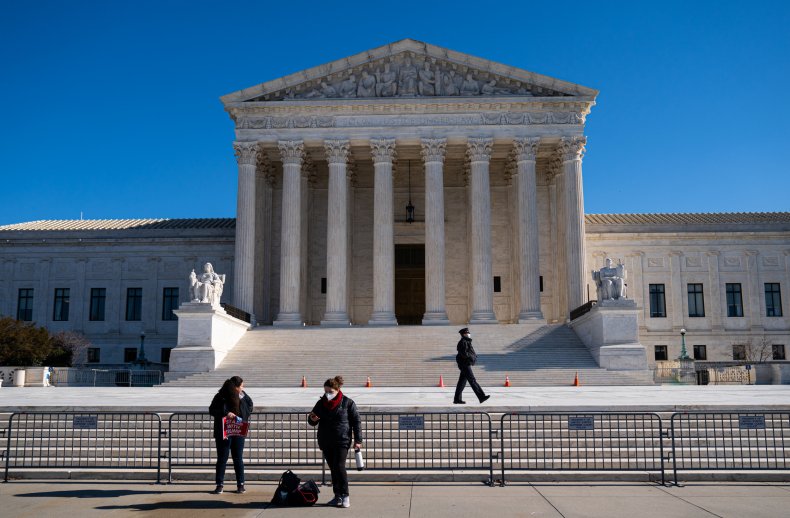Sixth Circuit Free Speech Ruling Stems Tide of Cancel Culture | Opinion
Cancel culture feels unstoppable. Every day, it seems, someone makes a public apology, loses a sponsor or has a career ruined—all for saying something that others disagreed with.
But the truth is that cancel culture is a paper sword. It seems frightening, but when someone has the courage to stand up and say no, it all falls to pieces.
That's exactly what happened at the U.S. Court of Appeals for the Sixth Circuit late last month. The court rebuked cancel culture and condemned the current trend of sacrificing public university professors' First Amendment rights to progressive ideology. The case, Meriwether v. Hartop, centers on the free speech rights of a professor who respectfully declined to use feminine terms to address a biologically male student.
Dr. Nicholas Meriwether works to cultivate an atmosphere of respect and spirited debate in his philosophy classes at Shawnee State University. He firmly believes that universities are a marketplace of ideas, and that students ought to be exposed to the best possible versions of opposing viewpoints, so they can make their own decisions about what to believe.
Dr. Meriwether is also a devout Christian—a fact that has not kept him from building strong relationships with students who hold very different beliefs. Indeed, one student wrote to him saying:
You and I saw eye-to-eye on very little and that made those arguments all the more valuable to me. If you had only made a half-hearted attempt at a counterpoint or (far worse) neglected to even mention an opposing position in order to spare my feelings, you would have been fundamentally undermining my education. I thank you for showing me enough respect to bring your "A-Game" to every in-class debate.
That is the best any professor can hope for: respectful, rigorous discourse with students, to equip them to grapple courageously with opposing ideas.
But then, one day, a male student demanded to be referred to with feminine titles and pronouns. When Dr. Meriwether paused to think about it, the student became aggressive, getting in the professor's face, cursing and physically circling him. Then the student threatened to get Dr. Meriwether fired.

The situation escalated. The student filed a complaint with the university, which launched a formal investigation. Dr. Meriwether offered to refer to the student by first or last name only. This would have allowed him to speak to the student respectfully and protected him from having to contradict his deeply held belief that God created sex as biological and immutable.
At first, the university was happy with that compromise. But when the student rejected it, the university changed course and formally charged Dr. Meriwether with "creating a hostile environment" and discrimination.
This is the spirit of cancel culture: only total acquiescence can be tolerated. It has no room for compromise, free speech or efforts to treat everyone with mutual respect. It demands absolute compliance and threatens to destroy anyone who does not comply. Cancel culture has a script, and so far, the university was following it perfectly. Shawnee State placed a written warning in Dr. Meriwether's file threatening disciplinary action if he did not give up his free speech rights and refer to students using whatever pronouns they demanded.
But then, Dr. Meriwether flipped the script. With the help of Alliance Defending Freedom, he filed a lawsuit against the university for its violation of his First Amendment right to free speech. And on March 26, the Sixth Circuit issued its decision in his favor, ruling that he could not be forced to speak a message that violated his beliefs.
The decision upholds the rights of all public university faculty members: "Simply put, professors at public universities retain First Amendment protections at least when engaged in core academic functions, such as teaching and scholarship." It called Shawnee State's attempt to censor Dr. Meriwether "anathema to the principles underlying the First Amendment."
The case may not be over. The university may appeal or even ask the Supreme Court to weigh in. But Dr. Meriwether's stand led to clear, uncompromising language from a circuit court upholding the free speech rights of all professors. If the university pushes back, and if Dr. Meriwether can prove what he says happened, the Sixth Circuit has effectively said that he should win.
The Constitution protects the rights of all people to express their beliefs, and no government can limit those rights simply because someone else disagrees. Because Dr. Meriwether had the courage to take a stand, all professors at public colleges and universities have a clear precedent for their rights to be protected.
We need more Dr. Meriwethers—because sometimes, all it takes to stop cancel culture is for one person to stand up and say, "I'm not giving up my rights, and I won't be bullied."
John Bursch, senior counsel and vice president of appellate advocacy at Alliance Defending Freedom (@Alliance Defends), represents Dr. Nicholas Meriwether in Meriwether v. Hartop.
The views expressed in this article are the writer's own.


